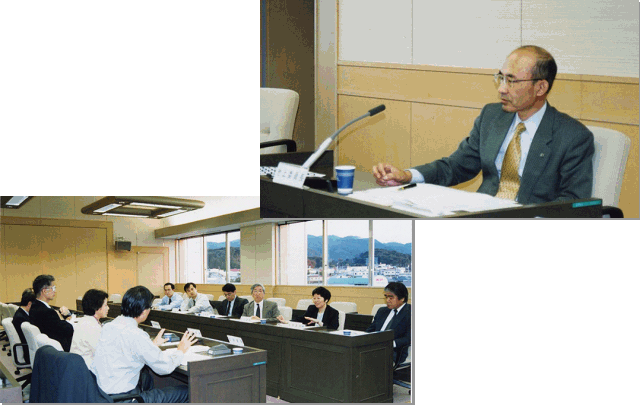Profile
1.Mission
|
In order to properly cope with structural changes of complicated and advanced society and economy, the development of new research that should form the basis for policy making it becoming more necessary. Under these circumstances, NISTEP sets its missions as follows:
|
||
2.Research subjects
|
With this basic recognition, NISTEP is to comprehensively and systematically implement the following survey and research from the wide-range, international and interdisciplinary points of view.
|
||
3.History
|
A report submitted by the Ad hoc Council for Promotion of Administrative Reform in 1985 pointed out the importance of S&T policy research as a process to strengthen functions of planning S&T policy. In response to this, July 1, 1988, NISTEP was founded as an affiliated research institute under the Science & Technology Agency, to serve as a core institute to conduct theoretical and empirical research on matters that would be the basis for developing S&T policy. NISTEP became an institute affiliated with the Ministry of Education, Culture, Sports, Science and Technology (MEXT) in January 2001, as a consequence of the administrative reform of central government. |
||
4.Characteristics
|
In NISTEP its researchers with academic background and those with administrative background engage their respective expertise in close cooperation to conduct a research. (1) Flexible research systemS&T policy research involves a variety of matters related to S&T, including social and economic phenomena. This spans an extremely wide and varied range of research approaches and methods that transcend existing frameworks. NISTEP has adopted a group system to allow it to flexibly deal with the policy issues of the day. Going beyond the standard structure of research groups, NISTEP also forms project teams made up of researchers within the institute that carry out research that cuts horizontally across the organizational structure. (2) Open research systemNISTEP strives to function as an open research institute by promoting research cooperation with external organizations both inside and outside the country and encouraging active exchange among researchers. Up until now, NISTEP has exchanged correspondence (MOUs) and has been cooperating in research on S&T policy with approx. 30 research organizations including foreign universities and national research institutes. On the personnel side, NISTEP has been promoting wide range of participation in research activities by not only Japanese but also foreign experts through visiting researchers program, and has actively accepted researchers via fellowship programs and joint research projects. NISTEP aims to form relationships with active researchers in a wide range of fields, to extend its research activities internationally, to expand its research network, to disseminate its findings and outcomes to the public, to search for new research themes, and to classify problems. For these purposes, NISTEP sponsors seminars and workshops that are open to the outside including relevant ministries, featuring renowned Japanese and foreign researchers and by holding international conferences once or twice a year. | ||
5.Institutional
evaluation
|
In September 2001, NISTEP decided its Medium-term Plan, laying out the direction of its research activities over the next five years or so. Adhering to the plan, in fiscal 2002 NISTEP carried out a comprehensive evaluation of its operations with a view towards improving its organizational and operational management and raising the efficiency and effectiveness of research activities to a new level. First, in March 2001 NISTEP invited two foreign experts to review the status of the institute's activities. Then, in April 2002 NISTEP formed an External Evaluation Committee comprising outside experts. The committee evaluated all aspects of NISTEP's operations, including its research activities. The committee completed an institutional evaluation and submitted its report to the Director-General in November 2002. NISTEP is developing it's activities on the basis of the report. The report can be read on NISTEP's website (http://www.nistep.go.jp). |
||

(October 2002, University of Aizu)